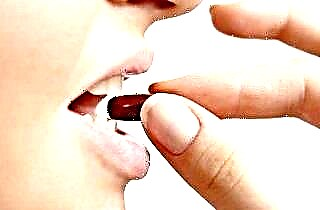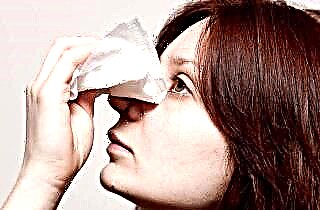Frontitis is a fairly common respiratory condition in which the lining of the frontal sinuses becomes inflamed. It starts like a common cold and is most often the result of an untreated cold or ARVI. To quickly get rid of the problem, many begin to drink antibiotics on their own during the front, which is a big mistake. If used incorrectly, they can only accelerate and complicate the course of the disease.
The main symptoms
 It is easy to suspect frontal sinusitis by the symptoms typical of this disease, the main of which is a headache localized in the front of the forehead. It is more pronounced in the morning, as fluid accumulates in the sinuses during the night. When pressed with fingers or light tapping, the pain intensifies and can be given to the orbit or temporal region.
It is easy to suspect frontal sinusitis by the symptoms typical of this disease, the main of which is a headache localized in the front of the forehead. It is more pronounced in the morning, as fluid accumulates in the sinuses during the night. When pressed with fingers or light tapping, the pain intensifies and can be given to the orbit or temporal region.
Frontitis is also accompanied by:
- an increase in body temperature - from insignificant to 39 and above;
- profuse nasal discharge: purulent or transparent, depending on the type and stage of the disease;
- constant congestion in one or both of the nasal passages;
- redness and swelling of the inner corners of the eyes and / or upper eyelid;
- discoloration of the skin over the bridge of the nose;
- irritability, decreased performance, weakness.
With purulent frontitis, there is usually a cough caused by constant irritation of the back wall of the larynx by purulent mucus flowing into it. Symptoms of general intoxication are often observed: nausea, bowel upset, vomiting.
But in no case can you make your own diagnoses and even more prescribe treatment. Before starting treatment, it is necessary to determine exactly what caused the disease. And this can be done only after passing a diagnostic examination.
Causes of the disease
If you start antibiotic treatment at the front without knowing the cause of the development of the disease, you can get the opposite effect. And even if the inflammation is provoked by pathogenic microorganisms, then it can be fungi, not bacteria. In this case, the use of antibiotics will only create favorable conditions for reproduction.
There are also external and internal factors provocateurs, eliminating which you can achieve a significant improvement in the condition even without the use of antibacterial drugs:
 the presence of chronic diseases of the respiratory system, including a non-infectious nature, weakening the immune defense;
the presence of chronic diseases of the respiratory system, including a non-infectious nature, weakening the immune defense;- severe overgrowth of polyps and / or adenoids, in which the narrow passage connecting the frontal sinus with the nasal cavity is blocked;
- significant curvature of the nasal septum, disrupting normal air circulation;
- severe hypothermia, overstrain, prolonged stress, chronic malnutrition, vitamin deficiency - everything that reduces immunity;
- frequent and severe allergic reactions, accompanied by swelling and profuse mucus production;
- the presence of non-healing wounds or ulcers in the nasal cavity, which become a constant source of infection.
Chronic frontitis in adults can be present as an occupational disease. At risk are those who work in rooms with polluted air or chemicals that are harmful to health: miners, metallurgists, workers in leather and woodworking shops, builders, employees of chemical plants.
Constantly irritated mucous membranes gradually become thinner, and the inflammation practically does not go away.
Indications and rules
Before treating frontal sinusitis with antibiotics, it is necessary to donate mucus from the nose for laboratory research. Bacterial culture allows you to accurately determine the presence of pathogenic microorganisms in the secretions, their type, and even check the sensitivity to various types of drugs.
 If the bacterial nature of the disease is not confirmed, the use of antibiotics is not necessary. Then other drugs in combination with the correct regimen and physiotherapy procedures are enough. With a fungal infection, antimycotic rather than antibacterial agents are needed for treatment. And it is impossible to find out the type of microorganisms without analysis!
If the bacterial nature of the disease is not confirmed, the use of antibiotics is not necessary. Then other drugs in combination with the correct regimen and physiotherapy procedures are enough. With a fungal infection, antimycotic rather than antibacterial agents are needed for treatment. And it is impossible to find out the type of microorganisms without analysis!
Important! The indications for the use of antibiotics are only:
- laboratory research data;
- prolonged or very strong increase in temperature;
- profuse purulent discharge;
- a sharp deterioration in the general condition of the patient;
- a strong increase in the level of leukocytes in the blood;
- postoperative period.
In any case, how to treat frontal sinusitis is decided only by a doctor according to the situation. And if he has not prescribed antibiotics, you do not need to buy and drink them yourself!
Antibiotics are powerful medications that, if used incorrectly, can cause serious damage to the body and cause a range of unwanted side effects. Therefore, when using them, the following rules must be strictly observed:
- Use drugs only as directed by your doctor.
- Keep a record of all previously taken antibiotics: which drug was used and for the treatment of which disease.
 Do not exceed the recommended dosage, take at specified intervals.
Do not exceed the recommended dosage, take at specified intervals.- Follow food instructions - before or after the antibiotic.
- If, for some reason, an antibiotic intake was missed, in no case can you compensate for it by increasing the dose in the next dose.
- Drink antibiotics only with clean water (unless otherwise indicated in the instructions).
- Refuse any alcoholic beverages (including beer and low alcohol!) During the course of treatment.
- Comply with the duration of the prescribed course of treatment.
- To include in the menu natural fermented milk products - this will help restore the intestinal microflora.
- Observe the prescribed daily regimen and a gentle diet, refuse spicy, fatty and fried foods.
It is necessary to constantly monitor the state of the body during antibiotic therapy. During the first day, even several hours after administration, an allergic reaction to the drug may appear. In this case, you must immediately take an antihistamine and stop taking the antibiotic, notifying your doctor about it.
Usually, a visible improvement occurs as early as 2-3 days after the start of treatment. If this did not happen, or the condition continues to deteriorate: the body temperature does not decrease, the pain does not go away, there is no outflow of mucus or pus is present in large quantities - most likely, the drug is ineffective and must be replaced. But only a doctor can do this, so you need to seek a second consultation.
Varieties of antibiotics
For the treatment of frontal sinusitis, four types of antibiotics are usually used, each of which has its own characteristics of use:
- Macrolides: "Erythromycin", "Azithromycin", etc. Their action is aimed at creating unfavorable conditions for the reproduction of pathogenic microorganisms, are very effective and have a wide spectrum of action. At the same time, they destroy the beneficial microflora, since they attack all microorganisms and negatively affect the functioning of the liver. Prescribed at the acute stage of the disease of unexplained etiology or with advanced chronic frontitis.
 Penicillins: "Augmentin", "Amoxicillin", etc. Preparations developed on the basis of penicillin - a natural antibiotic capable of affecting only some types of microorganisms. At the same time, it often causes severe allergic reactions, therefore, the minimum dose of the drug is given in the first dose.It is prescribed according to the results of bacterial culture, if the sensitivity of the infection to this particular drug is revealed.
Penicillins: "Augmentin", "Amoxicillin", etc. Preparations developed on the basis of penicillin - a natural antibiotic capable of affecting only some types of microorganisms. At the same time, it often causes severe allergic reactions, therefore, the minimum dose of the drug is given in the first dose.It is prescribed according to the results of bacterial culture, if the sensitivity of the infection to this particular drug is revealed.- Cephalosporins: Ceftriaxone and analogues. The antibiotic also belongs to the penicillin group, but at the same time the range of its action is significantly expanded and effective for almost any pathogenic microflora that can provoke frontal sinusitis. At the same time, it has a number of pronounced side effects, therefore it is prescribed only at a severe stage of the disease or if treatment with other drugs seemed ineffective.
- Tetracyclines. "Tetracycline" and analogues. They are prescribed only in case of intolerance to drugs of the penicillin series, have high toxicity, are not recommended for the treatment of children, are prohibited during pregnancy and lactation. They are often part of topical preparations and in this form give good results.
A specific drug should only be chosen by the attending physician, since he takes into account: the peculiarities of the course of the disease, the age and general condition of the patient, the presence of chronic diseases and other important factors.
Self-replacement of antibiotics or adjusting the dosage and duration of administration is not allowed!
Complementary treatment
But antibiotics alone cannot solve the problem. Treatment of frontal sinusitis should be comprehensive and must include:
- Other medicines: antihistamines, anti-inflammatory, antipyretic, tonic. They relieve pain and swelling, compensate for the negative effects of antibiotics on the body and help it recover faster.
 Nasal drops and sprays: antibacterial, antiseptic and anti-inflammatory. They restore damaged mucous membranes, relieve inflammation and swelling, and prevent the growth of microorganisms in the nasal cavity.
Nasal drops and sprays: antibacterial, antiseptic and anti-inflammatory. They restore damaged mucous membranes, relieve inflammation and swelling, and prevent the growth of microorganisms in the nasal cavity.- Washing the nose and sinuses. Eliminate mucus accumulations, relieve swelling, moisturize mucous membranes. In a stationary setting, catheter flushing can be performed if necessary.
- Steam inhalation. Quickly relieve swelling, facilitate breathing, and promote the liquefaction and discharge of accumulated mucus. They are carried out with a soda solution, herbal decoctions or medicines.
- Physiotherapy warming procedures: electrophoresis, UHF, darsonval, solux, etc. Relieve puffiness, activate blood circulation, promote the rapid discharge of mucus. They are not carried out with a purulent form of the disease!
Good results are obtained by combining traditional methods of treatment with traditional medicine. Drops on a vegetable or oil base, decoctions and herbal teas, home warming, breathing exercises, if used correctly, can significantly speed up the healing process.
But you need to remember that some plants weaken the effect of antibiotics, so it is better to consult a doctor before using them.
Contraindications and complications
Direct contraindications to the use of antibiotics are pregnancy, lactation and their individual intolerance. In all other cases, modern medicine allows you to choose the most effective and relatively harmless drug.
No one is completely immune from allergies and side effects. But with strict adherence to the instructions for use and the correct prescription of the drug, these risks are minimal.
In the absence of adequate treatment in severe or chronic forms, serious complications may develop: meningitis (inflammation of the meninges), encephalitis, sepsis, osteomyelitis, purulent abscesses.
The inflammation can spread to other respiratory organs and provoke bronchitis, tonsillitis, pneumonia and bronchial asthma. In this case, you will also have to use antibiotics, but much stronger ones and the course of treatment will be long. Therefore, it is not worth the risk. And if the doctor has decided on the need to use antibacterial drugs, it is better to agree with him.

 the presence of chronic diseases of the respiratory system, including a non-infectious nature, weakening the immune defense;
the presence of chronic diseases of the respiratory system, including a non-infectious nature, weakening the immune defense; Do not exceed the recommended dosage, take at specified intervals.
Do not exceed the recommended dosage, take at specified intervals. Penicillins: "Augmentin", "Amoxicillin", etc. Preparations developed on the basis of penicillin - a natural antibiotic capable of affecting only some types of microorganisms. At the same time, it often causes severe allergic reactions, therefore, the minimum dose of the drug is given in the first dose.It is prescribed according to the results of bacterial culture, if the sensitivity of the infection to this particular drug is revealed.
Penicillins: "Augmentin", "Amoxicillin", etc. Preparations developed on the basis of penicillin - a natural antibiotic capable of affecting only some types of microorganisms. At the same time, it often causes severe allergic reactions, therefore, the minimum dose of the drug is given in the first dose.It is prescribed according to the results of bacterial culture, if the sensitivity of the infection to this particular drug is revealed. Nasal drops and sprays: antibacterial, antiseptic and anti-inflammatory. They restore damaged mucous membranes, relieve inflammation and swelling, and prevent the growth of microorganisms in the nasal cavity.
Nasal drops and sprays: antibacterial, antiseptic and anti-inflammatory. They restore damaged mucous membranes, relieve inflammation and swelling, and prevent the growth of microorganisms in the nasal cavity.

